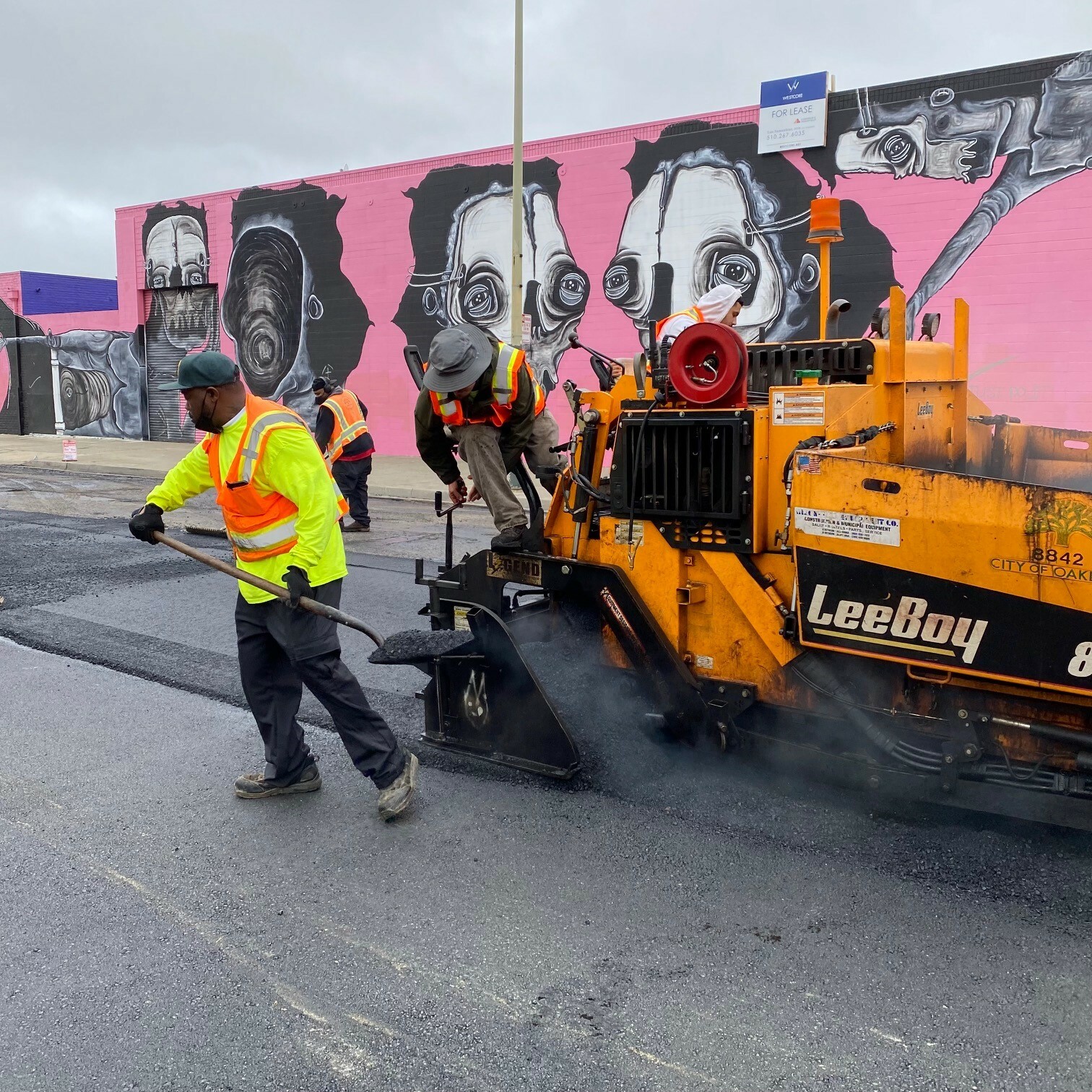City leaders announced Friday that, thanks to the incredible dedication of essential workers who continued their hard work throughout the ongoing COVID-19 pandemic, Oakland has broken a new paving record for the second year in a row, with more than 40 miles paved in the fiscal year that ran July 1, 2020 to June 30, 2021.
The previous record was set in the last fiscal year, with 32 miles paved between July 1, 2019 and June 30, 2020.
In 2019, the City of Oakland Department of Transportation (OakDOT) kicked off The Great Pave, three years of ramped-up street paving with a major street repair campaign focusing on local neighborhood streets and historically underserved neighborhoods. Thanks to the dedication of essential workers who have delivered paving work and other vital services throughout the ongoing pandemic, the plan is being delivered at a record pace. Further, OakDOT has continued increasing its investments to build internal capacity with in-house paving crews – and City staff themselves pushed the mileage over the 40-mile mark this year.
“The Great Pave continues to smooth our streets at an historic pace," Mayor Libby Schaaf said. “City of Oakland employees are the best in the business and nobody demonstrates their love for Oakland like our essential workers – and that’s why we’re celebrating a back-to-back record years of street paving today. These crews have been there for our community, day in and day out, throughout the unprecedented challenges and hardships of this pandemic. Their dedication is inspiring beyond words, and I am so grateful and honored to thank them today for their commitment and service.”
"As a former member of the Measure KK Infrastructure Bond Oversight Committee, I got to see paving plans as a civilian,” Councilmember Carroll Fife said. “Now as City Councilmember for West Oakland, I am excited to see those plans come to fruition. Shout out to city workers who, without their hard work even during a pandemic, this latest pavement milestone would not be possible."
“The hardworking crews that are out there making it happen are a daily inspiration to us all and a reminder of that deep call to service that unites all Oaklanders – we are humbled and inspired by their example,” OakDOT Director Ryan Russo said. “These safer, smoother streets and sidewalks are only possible because Oakland voters agreed to support these workers and these services with the landmark Measure KK, so we also recognize and thank our community for making the investment in the crews out here getting it done. And finally, we thank the City Council for adopting a first-in-the-nation paving plan that invests paving dollars by weighing equally the proportion of poor-condition streets in an area and the proportion of our underserved communities who live there, putting our Oakland values into action.”
Measure KK, passed by Oakland voters in 2016, provides $350 million in bond funding over a ten-year period to repair Oakland roads. In May 2019 the City Council adopted a paving plan OakDOT developed to put Measure KK funds to work, and that plan kicked off in earnest on July 1, 2019.
How streets were selected: in 2018 the City performed a survey of every street in Oakland to get updated information about each street’s condition. Additionally, both Measure KK and City Council's adopted prioritization process direct staff to consider equity and safety factors in spending. To add these factors to the paving program, OakDOT prioritized major streets by street condition and crash history, to keep major streets in good condition, and frontload safety improvements on the streets where the most fatal and severe crashes occur.
For local streets, OakDOT organizes its paving interments through nine planning areas – geographic segments that cover all of Oakland, and which are larger than neighborhoods but smaller than Council districts. The plan divides the $75 million in local streets repaving into these areas, weighing two factors: (1) the proportion of poor-condition local streets each area contains, and (2) the proportion of Oakland’s historically underserved communities that live in each area. These two factors – street condition and equity – are weighed equally and each area gets a share of the local streets funding according to that result.
To select individual streets, OakDOT first identified the worst streets near schools, and then prioritized the worst-condition streets in each area. The final list of streets was included in the plan when Council adopted it in may – that list is online in map form at https://www.oaklandca.gov/projects/2019-paving-plan.
Despite the advances of the paving plan, there are far more streets in need of repair than resources to immediately provide that repair. Residents are encouraged request infrastructure maintenance services and report problems through any of the following means:
- Phone: Call 311 from any phone within Oakland. (If calling from outside Oakland, use the number 510-615-5566.)
- E-mail: OAK311@oaklandca.gov
- Web: 311.oaklandca.gov
- Mobile App: OAK 311, available free for Apple and Android smart devices (powered by SeeClickFix)
